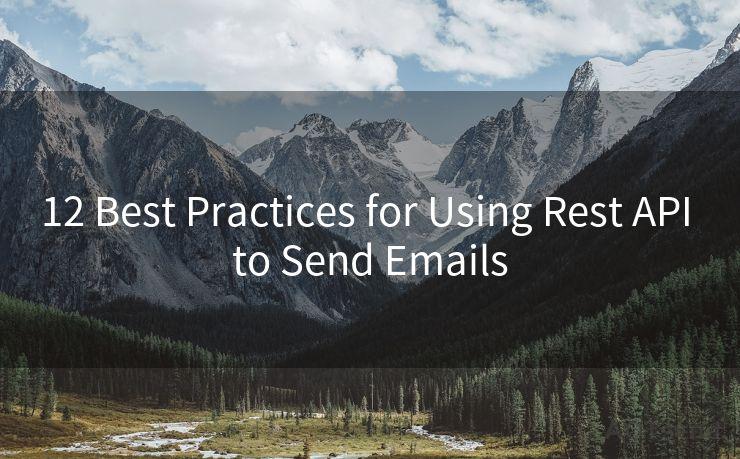12 Best Practices for Using Rest API to Send Emails




When it comes to integrating email functionality into your application or service, utilizing a REST API can provide a seamless and efficient solution. However, to ensure optimal performance and avoid common pitfalls, it's essential to follow best practices. Here are the top 12 best practices for using a REST API to send emails.
1. Understand the API Documentation
Before diving into the code, thoroughly read and understand the API documentation provided by the email service you're using. This will give you insights into the available endpoints, request formats, and response structures.

2. Authenticate Securely
Most email APIs require authentication. Use secure methods like OAuth or API keys, and ensure these credentials are stored securely, away from your source code.
3. Validate and Sanitize Inputs
Always validate and sanitize user inputs to prevent injection attacks. This is crucial when constructing email content or addresses dynamically.
4. Handle Errors Gracefully
Implement robust error handling mechanisms to catch and manage API response errors. This helps in debugging and ensures a smoother user experience.
5. Use HTTPS for Secure Communication
Ensure all API requests are made over HTTPS to encrypt data in transit and protect sensitive information.
6. Optimize Request Frequency
Be mindful of the API's rate limits and optimize your request frequency to avoid being throttled or banned.
7. Test in a Sandbox Environment
Before going live, test your email sending functionality in a sandbox or development environment. This allows you to catch issues without affecting real users.
8. Personalize Email Content
Utilize the power of APIs to dynamically personalize email content for each recipient, increasing engagement and relevance.
9. Monitor and Track Performance
Regularly monitor your email sending performance using analytics tools. Track metrics like open rates, click-through rates, and bounce rates to optimize your strategy.
10. Handle Unsubscribes and Complaints
Include an unsubscribe link in all emails and have a system to handle unsubscribe requests and complaints promptly.
11. Comply with Email Regulations
Ensure your email practices comply with regulations like CAN-SPAM, GDPR, and CCPA to avoid legal issues.
12. Keep Up with API Updates
🔔🔔🔔
【AOTsend Email API】:AOTsend is a Managed Email Service for sending transactional emails. Support Email Types: reminders, authentication, confirmations, notifications, verification codes, invoices, password resets, account activations, billing statements, two-factor authentication (2FA), and one-time passwords (OTP) emails, etc. $0.28 per 1000 Emails. 99% Delivery, 98% Inbox Rate.
You might be interested in:
Why did we start the AOTsend project, Brand Story?
What is a Managed Email API, How it Works?
Best 25+ Email Marketing Platforms (Authority,Keywords&Traffic Comparison)
Best 24+ Email Marketing Service (Price, Pros&Cons Comparison)
Email APIs vs SMTP: How they Works, Any Difference?
Email service providers constantly update their APIs. Stay updated with these changes to ensure your implementation remains effective and secure.
By following these 12 best practices for using a REST API to send emails, you can ensure a smooth, secure, and compliant email integration for your application or service. Remember, the key to success lies in understanding the API, securing authentication, validating inputs, handling errors, and staying vigilant about performance monitoring and compliance.




Scan the QR code to access on your mobile device.
Copyright notice: This article is published by AotSend. Reproduction requires attribution.
Article Link:https://www.mailwot.com/p2571.html



